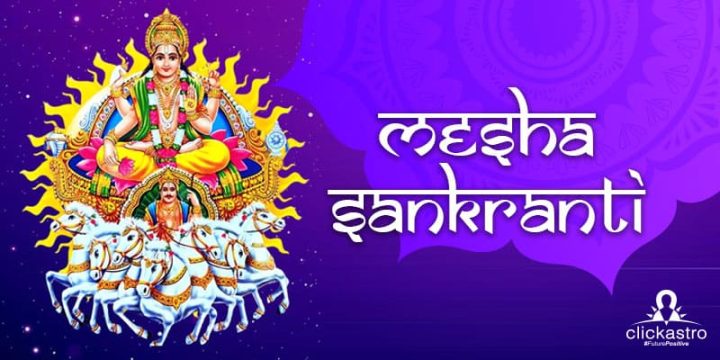Introduction
Mesha Sankranti is a revered
festival in the Hindu culture, signifying the dawn of a new year according to the Hindu lunisolar calendar. This auspicious occasion is celebrated with enthusiasm and reverence across India, from the snow-capped peaks of the Himalayas to the sun-kissed shores of the southern peninsula.
Mesha Sankranti marks the pivotal moment when the Sun transitions into the fiery zodiac sign of Aries, known as Mesha Rashi in Sanskrit. Falling typically on April 13th or 14th each year on the
Gregorian calendar, Mesha Sankranti encapsulates diverse cultural traditions and spiritual practices that have been passed down through generations. From the vibrant festivities in Tamil Nadu’s Puthandu to the joyous revelry of Kerala’s
Vishu, Mesha Sankranti unites diverse communities in a shared celebration of renewal, prosperity, and spiritual awakening.
The 2025 Mesha Sankranti is on Monday, April 14.
The Significance of Mesha Sankranti
Mesha Sankranti is significant as it marks the commencement of a new astronomical cycle, ushering in a period of renewal, prosperity, and spiritual evolution. According to the ancient wisdom of Vedic astrology, the Sun’s transition into the dynamic zodiac sign of Aries heralds the infusion of life-giving energy and vitality into the biosphere. This annual event marks the dawn of auspicious times, conducive to embarking on new endeavors, embracing fresh opportunities, and nurturing growth in all aspects of life.
Beyond its astronomical implications, Mesha Sankranti carries a deeper symbolic resonance, inviting individuals to engage in introspection, express gratitude for past blessings, and seek divine guidance for the journey ahead. It serves as a sacred juncture for realigning with one’s inner purpose, fostering spiritual awakening, and fostering a sense of interconnectedness with the universe. As devotees rejoice in the warmth of the Sun’s embrace, they embrace the promise of a bountiful and transformative year ahead.
Important Timings On Mesha Sankranti 2025
- Sunrise – April 14, 2025 6:10 AM
- Sunset – April 14, 2025 6:43 PM
- Sankranti Moment – April 14, 2025 3:21 AM
- Punya Kaal Muhurta – April 14, 6:10 AM – April 14, 12:27 PM
- Maha Punya Kaal Muhurta – April 14, 6:10 AM – April 14, 8:15 AM
Regional Variations and Celebrations
Mesha Sankranti unfolds across the diverse cultural topography of India with a kaleidoscope of regional variations and vibrant celebrations, each imbued with its nuances and traditions. In Tamil Nadu, the festival assumes the name Puthandu, where families adorn their homes with intricate kolam designs, visit temples, and partake in sumptuous feasts. Kerala’s Vishu is characterized by the ‘
Vishukkani‘ ritual, where auspicious items are arranged and viewed first thing in the morning to invite prosperity and blessings for the year ahead.
Punjab erupts in exuberance during
Vaisakhi, marked by colorful processions, traditional dance performances like
Bhangra and
Giddha, and the sharing of delectable festive treats like ‘langar.’ Assam resonates with the rhythmic beats of the Bihu dance during the Bihu festival, celebrating the spring harvest with fervor and merriment.
Orissa’s Pana Sankranti sees devotees flocking to temples to offer prayers and partake in community feasts featuring the traditional ‘pana,’ a refreshing drink made from jaggery and water. In West Bengal, Pohela Boishakh ignites the streets with joyous processions, cultural performances, and elaborate feasts, marking the Bengali New Year with zest and zeal.
Despite the vast number of names and rituals, the underlying essence of Mesha Sankranti remains constant – a jubilant celebration of new beginnings, unity, and the eternal cycle of life. Across the length and breadth of India, people come together to rejoice in the promise of a fresh start and the boundless possibilities of the year ahead, bridging cultural divides with shared joy and camaraderie.
Rituals and Traditions
The sacred occasion of Mesha Sankranti is adorned with a multitude of rituals and traditions, each imbued with deep spiritual significance. At the heart of these observances lies the fervent worship of various deities, invoking their blessings for prosperity, well-being, and spiritual growth. Devotees across the country pay homage to Lord Shiva, Hanuman, Vishnu, and Maa Kali, offering prayers and performing rituals to seek divine favor and guidance for the year ahead.
Central to the Mesha Sankranti rituals is the act of purification through bathing in the sacred waters of divine rivers such as the Ganga, Yamuna, and Godavari. This cleansing ritual is believed to wash away impurities and sins, renewing the soul and preparing it for the journey ahead. As the devotees immerse themselves in the holy waters, they offer prayers for forgiveness, redemption, and spiritual upliftment.
Special prayers,
pujas, and hymns form an integral part of Mesha Sankranti celebrations, resonating with the divine energies and invoking blessings for a harmonious and auspicious year ahead. From the recitation of Vedic mantras to the chanting of sacred hymns, devotees seek to establish a deep connection with the celestial realms, seeking divine favor and protection for themselves and their loved ones.
The offering of ‘Pana,’ a traditional drink made from jaggery and water, holds profound symbolism in Mesha Sankranti festivities. Beyond its culinary significance, ‘Pana’ symbolizes the essence of sharing, communal harmony, and compassion towards others. It is a time for acts of charity and seva, as devotees engage in philanthropic activities to alleviate the suffering of the less fortunate and spread joy and abundance in their communities.
Observing the ‘punya kaal’ muhurat, the auspicious period surrounding Mesha Sankranti, is imperative for devotees, ensuring that all actions are performed during this propitious time to maximize the benefits of their deeds. From performing sacred rituals to embarking on spiritual pilgrimages, devotees meticulously adhere to the auspicious timings, seeking to harness the divine energies and blessings that abound during this sacred occasion.
Mesha Sankranti also provides an unparalleled opportunity for spiritual pilgrimage, as devotees flock to revered temples and sacred sites across the country to offer prayers and seek divine blessings. From the majestic Puri Jagannath Temple to the serene Samaleshwari Temple, devotees embark on a sacred journey, seeking solace, inspiration, and divine intervention in their lives.
The day of Mesha Sankranti is filled with joyous celebrations, adorned with vibrant attire, melodious songs, and rhythmic dances, reflecting the spirit of unity, communal harmony, and collective rejoicing. As the sun sets on Mesha Sankranti, it leaves behind a trail of blessings, hope, and renewed spirits, ushering in a new chapter filled with promise, prosperity, and spiritual fulfillment.
Conclusion
The revered occasion of Mesha Sankranti exists as a testament to the enduring traditions and spiritual values cherished in Hindu culture. It serves as a poignant reminder of the cyclical nature of life, inviting devotees to reflect on the past, embrace the present, and welcome the future with optimism and gratitude. As the Sun transitions into Aries, may this auspicious occasion bring forth a renewed sense of purpose, abundance, and prosperity in the lives of all who celebrate. Let us unite in the spirit of reverence and celebration, honoring the divine blessings bestowed upon us and embracing the journey ahead with open hearts and uplifted spirits. May Mesha Sankranti herald a year filled with inner peace, spiritual growth, and boundless joy for all.









I just checked out your website online and wanted to say thank you! Your article on Mesha Sankranti used to be virtually beneficial and informative. I recognize how sincerely you defined the magnitude of this festival. Keep up the splendid work!
Wonderful insights on Mesha Sankranti! Your detailed explanation of its significance and rituals makes it so easy to understand and appreciate this festival. Thanks for sharing!